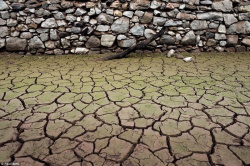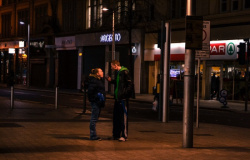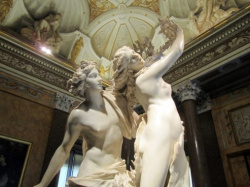My milestone poet: Kim Moore

Just over two years ago I worked out that since April 2014, I’d published 275 posts on my own poetry site, the great fogginzo’s cobweb. I estimated that it meant I’d published about half a million words about poets and poems, and I wanted to celebrate. I wrote three posts I called Milestones which were ‘thank-yous’ to three significant poetry folk: Gaia Holmes, who gave me my first solo guest poetry reading; the legendary poetry blogger Anthony Wilson for my first invitation to be a guest blogger; and, for my first time as guest poet on a poetry blog in April 2013, to Kim Moore.
This will be the 42nd post for Write Out Loud since I started early last year. Another milestone, since it will also be the last. I’ve just run out of steam, or ideas, or things to say, and it’s time to take a sabbatical and recharge the batteries.
It’s also a chance to say a heartfelt thank you to Julian Jordon for the invitation to be the regular guest blogger for Write Out Loud. And also more thanks than I can count to my editor Greg Freeman, and for the prodigious work he does to promote live poetry events around the UK. And here’s a bit of synergy. I first met Greg when he was travelling around the country, dropping in to poetry events, and it happened that one was at the Puzzle Hall Inn in Sowerby Bridge. Subsequently, for various reasons I ended up jointly organising the monthly readings there. And next Monday, after five years, Bob Horne and I will do our last stint as the compere/MC team. We’re taking another sabbatical, and looking forward to turning up every month, sitting back and listening. It’ll be lovely.
Here’s another bit of synergy. The Puzzle Hall Inn was where I believe Kim Moore and I became friends.
I’d been a fan of her poetry blog The Sunday Poem for a long time, so in 2013, when Kim invited me to send her a poem for her blog it was a very big deal. I’d gone to a Puzzle Hall Poets Live night, in the days when Gaia Holmes was running it. Kim was the guest poet; I did one poem on the open mic and Kim took a punt on it. Now, seven years ago I’d had very few poems published, and I’d certainly produced no books or pamphlets. It’s moments like this that show just how important to your confidence it can be to have your writing validated by someone sharing it.
Since then, Kim has been inspirational in all sorts of ways, not least via her residential courses. I’ve had two prize-winning poems come out of those. She’s taught me how to be rigorous with my own stuff, how to read, how to breathe through poems with long sentences (we both like those). She helped me to write honestly about the death of my son, and to find a language to frame it in. She gave me (and others) the example of her own courage in confronting personal trauma in her poetry, and also (for me) the way in which the myths of transformation can be a holding frame for our own stories. She has never stopped encouraging me to believe I can do it. Whatever ‘it’ is.
So, I’m celebrating (is that the right word) my last post by revisiting the milestone post I wrote for her in 2017.
I’ve said thank you before. If you have the time, you can follow the link to something I wrote the year her first collection The Art of Falling came out. When I read that collection I was convinced it would make a big splash. I couldn’t understand why it didn’t win every prize going. I felt personally affronted when it seemed to very quietly slip out of sight. But two years on, it suddenly got the recognition it deserves. As she wrote in 2017:
“Perhaps the most exciting thing that has happened to me happened very recently – my book, published in 2015, won the Geoffrey Faber Memorial prize. Maybe I’m destined to win prizes with the name Geoffrey in the title? The judges were Gillian Clarke, Katharine Towers and Tom Gatty, and Gillian said such nice things about my collection in her speech that she made my mum and dad cry. It was particularly nice to win this prize because I knew nothing about it until I’d already won it, so no nail-biting shortlists, just a lovely surprise that I wasn’t expecting.”
It made me very happy, too.
I asked her for a poem from an earlier blog, and this is the one I chose. Whenever I read it, I think of the drowned villages that reappear in times of drought. I like everything about it, its fully imagined landscape, that strange (but right) image of the man and woman whose hair flowed to their waists…and the bleakness of its vision, its pity for the human condition makes me weep.

(after Ovid)
We learnt that we were born from stones, that the last
man and woman to survive the flood climbed from their raft
onto the shoulders of a mountain and looked across the water
which had swallowed everything.
For days there had been a sea but no shore, now as the water
curled back its lip and let go of the tops of trees
the man and woman followed, walking down the slope,
their feet touching the edges of the water,
their arms full of the bones of the earth, their hair long
and flowing to their waists. They cast stones behind them
and from the hand of the man a stone fell and grew into
another man and from the hand of the woman
a stone fell and grew into another woman and so we grew,
our eyes like flints and our mouths tasting of the earth.
We were born from stones and we were destined to live
like stones, warming ourselves in the sun,
cracking when the temperature fell, we said there was
something of the sea in us, but in this, like many other things
we lied, it was never water in our hearts, we carried stones
in our pockets, we carried them in our hands.
It’s a poem that matters, isn’t it? It’s a real poem. A real poem? I stick with Clive James’ definition. A real poem is “well separated” . You hear “the force of real poetry at first glance” . It’s marked by its clarity, its avoidance of “the spectacular expression that outruns its substance”. What an important idea that is … just that one word “substance”. How good it is to be reminded that a poem has to be about something real and concrete, because “everything depended, and still depends, on the quality of the moment…whatever kind of poem it is, it’s the moment that gets you in”.
That explains to me why some poems simply nail ‘it’ for me. Poems that are memorable for themselves, that hold together, and surprise, and make themselves your friends for life. Like the poems that Gordon Hodgeon let me share. Like Jo Bell’s ‘The archaeologist of rivers’ and ‘Eve naming the birds’. Like Fiona Benson’s Bright travellers. Robin Robertson’s ‘At Roane Head’. But above all, and especially in these last seven years, poem after poem by my inspiration, involuntary mentor, and special landmark/milestone guest, Kim Moore.
I’m going to finish with three poems I chose from the many she sent me. The first one I loved the first time I heard her read it at the Chemic Tavern in Leeds. It’s got the long sentences that she effortlessly breathes through, that never lose their balance, and possibly my favourite image, the moment that draws me in, that memorises itself
we lay twice a week
in each other’s beds like two unlit candles.
All the Men I Never Married
No 1
(after Andrew McMillan)
There was the boy who I met on the park
who tasted of humbugs and wore
a mustard yellow jumper, and the kickboxer
with beautiful long brown hair that he tied
with a band at the nape of his neck, and the one
who had a constant ear infection so I sat always
on his left, and the guy who worked in an office
and could only afford to fill up his car with £2
worth of petrol and the trumpet player I loved
from the moment I saw him, dancing
to the Rolling Stones. The guy who smoked weed
and got more and more paranoid, whose fingers
flickered and danced when he talked, the one
whose eyes were two pieces of winter sky,
a music producer, long-legged and full of opinions
and more trumpet players, one who was too short
and not him, and one who was too thin and not him,
are you judging me yet, are you surprised?
Let me tell you of the ones I never kissed,
or who never kissed me, the trombonist
I went drinking with, how we lay twice a week
in each other’s beds like two unlit candles.
We were not for each other and in this we were wise,
we were only moving through the world together
for a time. There was a double bassist who stood
behind me and angled the body of his bass into mine
and shadowed my hands on its neck and all I could feel
was heat from his skin and the lightest breath
and even this might have been imagined.
I want to say to them now though all we are to each other
is ghosts, once you were all that I thought of.
When I whisper your names, it isn’t a curse or a spell or a blessing.
I’m not mourning your passing or calling you here.
This is something harder, like walking alone in the dusk
and the leaves, this is the naming of trees,
this is a series of flames, this is watching you all disappear.
(Previously published in The Dark Horse)
The next one reminds me of an exercise that Kim set…I think it might use a Clare Shaw poem as a starting point….but the focus is on those sins of omission that plague us sometimes before we wake up properly. The memory of a wrong that passes without our intervention, because we’re afraid to do what we think is right.

No 15
Remember that night we’d been out drinking
and on the way home heard raised voices,
saw a couple across the road, arguing, leaning
towards each other and then he slapped her,
once, across the face then turned and walked away.
She stood there for a while and then she followed,
down Rawlinson Street as the lights from passing cars
fell on her, then swept on by. We didn’t call out
or phone the police. We didn’t speak, not to her
or him or to each other. When we got home
we didn’t talk about the woman in the denim skirt,
holding her white shoes by the straps. I wasn’t
close enough to see her feet, yet I remember them,
the blackened soles from walking on the pavement,
the sore on the heel where the strap had rubbed
and raised a patch of red. We did not speak of her
and so we made her disappear, limping into the night,
trying to keep up with that man, who knew she’d follow
so did not turn around, hands thrust into his jeans,
front door key hot between his fingers.
(Previously published in Poetry Ireland Review)
Finally, an absolute stunner, a showstopper. A poem that should make you rethink what you feel about Keats’ ‘Ode to a Grecian urn’ and its “still unravished bride of quietness”. How easily that “unravished” can slide past your attention. It makes me think especially of Bernini’s Apollo and Daphne that’s so astonishingly made, so flawless, that you forget what it’s about, what’s happening. I chose this to say thank you for the gift of Ovid, and the tales of metamorphosis and transformation, and for the way Kim’s poems that confront the business of domestic abuse and its trauma made me see the Greek myths differently, and made them help me to see my own life more clearly.

When I open my ribs a dragon flies out
and when I open my mouth a sheep trots out
and when I open my eyes silverfish crawl out
and make for a place that’s not mine.
When I open my fists two skylarks fly out
and when I open my legs a horse gallops out
and when I open my heart a wolf slinks out
and watches from beneath the trees.
When I open my arms a hare jumps out
and when I show you my wrists a shadow
cries out and when I fall to my knees
a tiger slips out and will not answer to me.
Now that the tree that grew in my chest
has pulled up its roots and left, now that I’m open
and the sky has come in and left me with nothing
but space, now that I’m ready to lie like a cross
and wait for the ghost of him to float clear away,
will my wild things come back, will the horse
of my legs and the dragon of my ribs,
and the gentle sheep which lived in my throat
like a breath of mist and the silverfish
of my eyes and the skylarks of my hands
and the wolf of my heart, will they all come back
and live here again, now that he’s left,
now I’ve said the word whisper it rape
now I’ve said the word whisper it shame
will my true ones, my wild, my truth,
will my wild come back to me again?
Previously published in The North
What a way to start the year. Here’s a prayer and a candle lit for 2020. May your wild come back to you again. Although , in Kim’s case, I think that it possibly has.
If you haven’t already bought her books, then now’s the time.
If we could speak like wolves, Smith | Doorstop, 2012
The Art of Falling, Seren, 2015
So there you are. All my inspirations recognised. Just one last thing before I go. I want to say thank you to all those poets who took the time to write about themselves and to let me share their poems in the last twelve months. Thank you: Elizabeth Sennitt Clough, David Constantine, Bob Beagrie, Jane Lovell, Ann Gray, Grainné Tobin, Clare Shaw, Victoria Gatehouse, John Paul Burns, Christy Ducker, Carole Bromley, Char March, Yvonne Reddick, David Underdown and Gaia Holmes. If I’ve missed any, mea culpa.
And now, as it says in the book: So long, and thanks for the fish.




